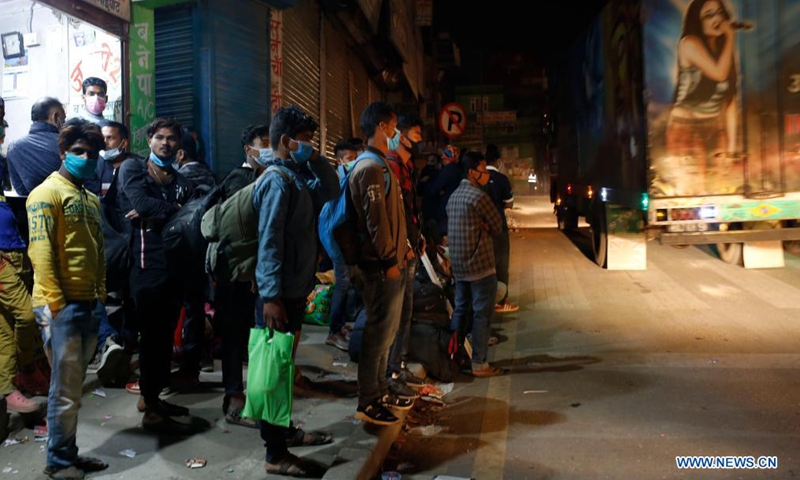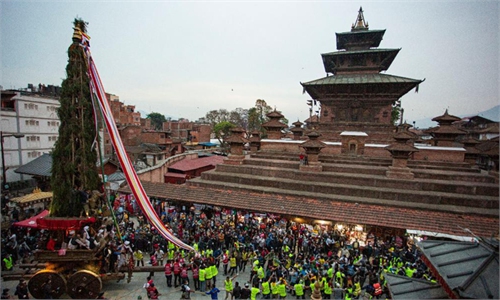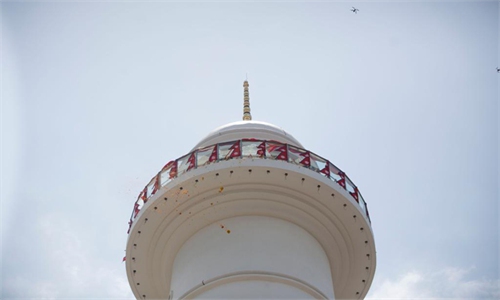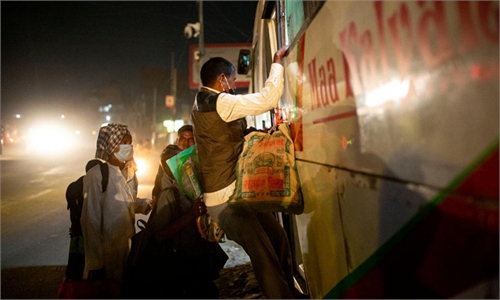Chinese enterprises stand with locals, try to prevent Nepal becoming 'mini-India' in virus cases

People wait for the long route bus to go back to their village prior to lockdown imposed to curb the COVID-19 infections in Kathmandu, Nepal, April 28, 2021.Photo:Xinhua
Some Chinese enterprises in Nepal have suspended or slowed down work as the COVID-19 epidemic in Nepal continues to worsen. Local Chinese associations voiced support for the country's anti-epidemic fight and said they stand ready to help with medical aid for Nepalese people.
Nepal has recorded a total of 351,005 confirmed COVID-19 cases, with 3,417 deaths as of Wednesday, according to The Kathmandu Post.
While the world's attention is focused on India, the world's worst hit country by the coronavirus in terms of the rising number, its northern neighbor Nepal reported more than 7,000 daily cases for three days in a row from Sunday to Tuesday, "turning into a mini-India" as doctors at Nepal's Bheri hospital reportedly said.
The grim epidemic situation has made some Chinese enterprises in Nepal suspend or delay work, but no plan has been made to leave the country for the time being.
"We decided to postpone the project construction due to the outbreak this time," a local project manager of a Chinese-invested firm, who asked to remain anonymous, told the Global Times on Wednesday.
The manager said Nepal had closed the country for five months due to the epidemic. The feasibility study-related field work of the project has already been delayed as personnel, machinery and materials could not be sent to the country.
Another person close to a China-assisted project in Nepal told the Global Times on Wednesday that "government projects will not stop with normalization of the epidemic, but they will take measures to advance steadily."
"The epidemic situation is severe in the country at the moment, but we aren't considering leaving at the moment," the person, who preferred not to be named, said.
All workers in the project have been vaccinated, and anti-epidemic materials are also adequate to ensure their security, the person said.
Nepal, a country with a population of fewer than 30 million people, is reportedly facing a shortage of hospital beds, oxygen and other medical supplies as the country's medical system is scrambling to handle the resurging COVID-19 cases.
Prime Minister of Nepal K.P.Sharma Oli on Monday requested Nepal's neighboring countries and the international community to offer assistance with vaccines and critical care medicines supply to support the country's anti-epidemic fight, Reuters reported.
Oli said that Nepalese government officials are in contact with China and Russia and other manufacturers to urgently secure vaccines, according to the report.
Chen Xiaoshuang, deputy president of the Nepal Overseas Chinese Association, told the Global Times on Wednesday that the association is willing to provide medication and other healthcare to Nepalese people if necessary as the epidemic situation in Nepal continues to worsen.
He said a "Love Pharmacy" initiated by a Chinese medical aid team is about to be established to provide essential medicines for the association, including COVID-19 related medications.
The association is ready to help Nepalese people with these materials if needed, he said.
The Kathmandu-based association has been engaged in providing assistance to local Nepalese amid the pandemic. In August 2020, Chen and other Chinese in the country donated food, money and goods to Syabrubesi village, distributing 25 kilograms of rice and 1,000 rupees to each villager of 170 households.
The Chinese government sent 800,000 doses of Sinopharm-developed COVID-19 vaccines to Nepal on March 29.
On April 7, the Nepalese government started administering the vaccines gifted by China to citizens. Around 300,000 people have received the Sinopharm vaccine by the end of April.



